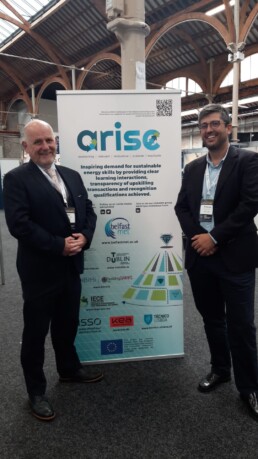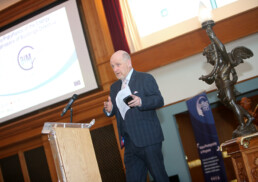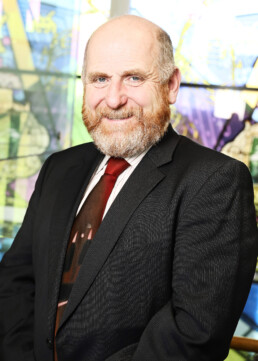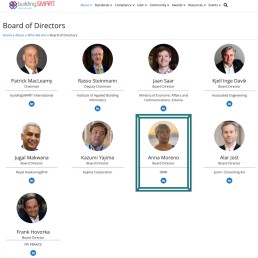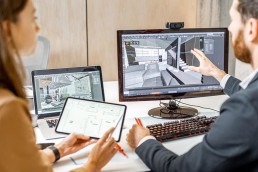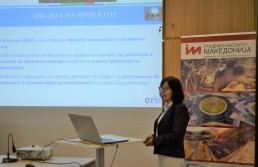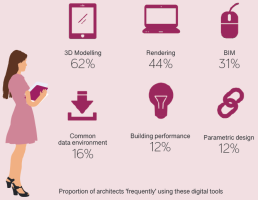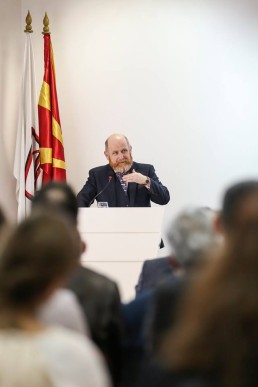BIM Coordinator article 2022
ARISE Programme Manager Paul McCormack spoke at the 2022 BIM Coordinator Summit in the RDS in Dublin on September 8. Paul wrote an article for the event, 'What is it that we cannot see ?' Read here:PAUL BIM CORD ARTICLE
BIM Basics article
ARISE Programme Manager Paul McCormack has written 6 BIM related articles in the past year for the Dublin based Building Services magazine. Read article 2 of the 6 here: ARTICLE 2- BIM Part 2
Digitalisation in the Built Environment article
ARISE Programme Manager Paul McCormack has written six articles on BIM for the Dublin Building Services magazine. Article one is 'Digitalisation in the Built Environment'. Read the attached link.ARTICLE 1-Digitilisation
Anna Moreno from ARISE Partner appointed to directors' board at Building Smart
During the first day of the buildingSMART International Council, which took place in Zurich on June 28 and 29, the members of the Board of Directors were announced.
Among the new appointments to the Board, we are thrilled to announce the election of IBIMI buildingSMART President Anna Moreno, who commented on her election as follows:
"I have known the interoperability industry for more than 30 years. I served on the ISO TC 184 -SC4 technical committee as an expert on traceability of information regarding materials. I remember my first meeting, it was held in Turin and more than 200 people participated divided into various breakouts: buildings, ships, aircrafts... I asked, "But where are the Italians?" They answered, "You are the only one" and I remained the only Italian for over 25 years.
So when I decided to found IBIMI, which is our association of BIM professionals, I told myself I didn't want to be alone anymore. Today we are the Italian chapter of buildingSMART and we have about 200 members. Thank you for this opportunity, it's really nice not to feel alone anymore!"
IBIMI- Institute for BIM Italy- is a nonprofit association that promotes and supports the digitization of the construction industry, and is the Italian Chapter of the global community buildingSMART. The association is a partner in the ARISE project, leading the WP2 "Benchmarking Energy e Digitalisation Skills"
The Italian Strategy for the qualification of BIM Professional Roles
Over the course of the last few years, IBIMI has developed the so-called Italian OpenBIM roadmap. It is like a path in which to grow and consolidate as an association on a Italian national scale and to be able to give BIM professionals the opportunity to be certified internationally according to the certification programme of buildingSMART International, an international body that oversees the development of open standards such as the IFC format. Common language and shared process are the founding bases that BIM professionals involved in the management of information throughout the building or civil supply chain (survey, design, construction, use, decommissioning) must possess.
On this assumption IBIMI is at the forefront of the development of certifications for figures such as BIM Specialist, Coordinator and Manager. These certifications will cover one of the first important milestones of the buildingSMART certification programme together with the, already widespread in Italy, Individual Qualification on the foundations of BIM methodology.
The association aims to make these certifications and related courses, available by training providers, by the end of this year or by the beginning of next year. The vision is to be able to develop certifications for other types of BIM professionals in the coming years, such as the CDE Manager, site operator, and so on.
On this page you will find the link to download the full document "THE ITALIAN STRATEGY FOR THE QUALIFICATION OF BIM PROFESSIONAL ROLES": https://www.ibimi.it/download/
ARISE Partner Meeting in North Macedonia-June 21-22, 2022
ARISE Partner Meeting in North Macedonia
The latest Meeting of the Belfast Met led £1.12 million EU digital construction project, ARISE is being held this week in North Macedonia, (June 21-22)
At the home of ARISE Partner IECE, (Institute for Research in Environment, Civil Engineering and Energy) in Skopje, North Macedonia, the nine core ARISE European partners are meeting to continue their transformational work in empowering the digital transformation of the built environment.
The open session event was themed: ‘Improvement and recognition of digital and sustainable energy skills in the construction sector of North Macedonia-needs, opportunities and challenges,’ and detailed the leading role the country is playing, leveraging skills transformations to achieve carbon reductions in the built environment
The Keynote Speaker of the event was Mr Deyan Metikosh, Vice President of the Chamber of Certified Architects and Engineers of North Macedonia. Mr Metikosh spoke on ‘Digital transformations and BIM Methodology-the priority in the processes of continuous improvement of skills of certified architects and engineers’.
Also among the speakers was Mr Vlatko Ivanov, General Manager of Civil Engineering Institute Macedonia who spoke on ‘Needs of the construction sector in North Macedonia for upskilling the knowledge and skills.”
Mrs Dijana Likar, Co Ordinator of the IECE Project team presented on ‘Project ARISE in perspective of national stakeholders’.
ARISE Programme Manager Paul McCormack said: “The ARISE project seeks to create a level digital skills playing field across Europe and to support industry and individuals within the built environment to map their individual digital transformation journey. Through micro credentials, certcoins, time credits we can revolutionise the skills process for blue and white collar workers. With these new skills we can also help decarbonise construction and stimulate energy skills across all levels within construction. Our ARISE Partners from Italy, North Macedonia, Portugal, Ireland, UK, Brussels and Denmark are all contributing to developing this new trans European skills process. Our Partner Meeting in Skopje, North Macedonia is another step in creating new learning pathways.”
The new system of training and recognition of digital skills will be valid across the EU thus increasing the spread of skilled workers in the building market.
Ends
SEAI Breakfast BIM briefing
USING BIM TO CONTROL ENERGY IN THE BUILT ENVIRONMENT
On March 30-31, 2022 the SEAI Breakfast Briefing was held at the SEAI Energy Show in Dublin. The briefing focused on: USING BIM TO CONTROL ENERGY IN THE BUILT ENVIRONMENT
The panel members included: Dr Avril Behan, Project Director, Build Digital, TU Dublin, Michael Curran, Chairman CIBSE Ireland and Head of Building Services, Energy and Utilities, NUIG, Michael Early, BIM Champion and BIM Manager, DAA, Joseph Mady, MD, Digital Construction technologies and Eamonn Sheils, SEAI Programme Manager-Commercial Retrofit.
While digitalisation of the construction process is now recognised as the way forward if we are to realise net zero energy and carbon buildings, BIM is the enabling tool that will make the transformation possible. BIM can transform traditional information processes into data that is easier analysed and shared across the AEC sector so that architects, engineers and contractors communicate on a common platform.
However, as with all new processes and technologies, there is a learning curve for those involved. Hence, this breakfast briefing comprised a panel discussion between experts from each of the key construction disciplines who shared their experience and opinions on how BIM can best be utilised, and the various challenges posed can be met.
The presentations and discussion covered four primary quadrants of the energy cycle – Plan: Potential energy; Design: Embedded energy; Build: Operational energy; and Operate: Sustainable energy.
https://www.youtube.com/watch?v=J6-TYTruJSc
Stimulating the demand for skills article
ARISE Programme Manager Paul McCormack has had his 6th article published in a series of 6 for the Dublin magazine, Building Services Engineering. The article by Paul, titled: 'Stimulating the demand for skills' is on pages 44 and 45 of the April 2022 issue. You can read it here:
https://buildingservicesengineering.ie/https-buildingservicesengineering-ie-wp-content-uploads-bim-part-6-pdf/
Digitalisation: what is changing for architects?
An interview with Veronika Schröpfer, Head of EU Research Projects at the Architects’ Council of Europe
>> Digitalisation is changing the work of architects around the globe. At the moment there are around 560.000 architect in Europe, most of these working alone or in small offices. SMEs have the advantage to be quicker to adapt to new technologies and tools. Architects have shown themselves to be extremely willing to learn, more than half of those using each tool are self-taught. Architects are much more likely to use new tools out of personal or business interest than due to client or regulatory requirements. This shows that architects are enthusiastic to adopt digitalisation tools.
The role of the development of digital competences in the building domain
>> Architects contribute around 17 billion Euros to the EU economy (ACE, sector study 2020). Nevertheless, ACE has advocated for more diversity in software and tool providers. Annual licence fees for software can be a barrier for micro sized architecture practices. They cannot afford various licences for similar tools but different providers depending on the project. Hence the interoperability of tools and platforms are vital.
>> You can see in our 2020 ACE sector study, that there has been a proliferation of new digital tools which the architectural profession is adopting. A majority of architects use 3D modelling tools ‘frequently’, and nearly half use rendering tools frequently. About one in three architects frequently use BIM on their projects. An important aspect is that most architects use the tools out of their own choice.
The impact of putting in place a recognition system valid at European level
>> Our 2020 ACE Sector Study has revealed that the vast majority of architects taught themselves how to use digital tools.
No more than 35 per cent received formal training for any of the tools, although more received informal training. On average architects spend about 20 hours of official Continuing Professional Development (CPD) per year. CPD is a structured way of maintaining and developing the competence as a qualified professional by engaging in regular learning activities. For a training recognised and valid at EU level it should be endorsed by ACE Member Organisations in various EU Member States and meet the minimum agreed European quality standards. Various European training bodies should recognise each other’s CPD, making it easier for architects to work in the countries they choose. Usually, one learning hour equals one international CPD credit. Therefore, we joined the ARISE project, as it will work on the recognition of the CPD competences through the development of a platform based on microunits certified with blockchain.
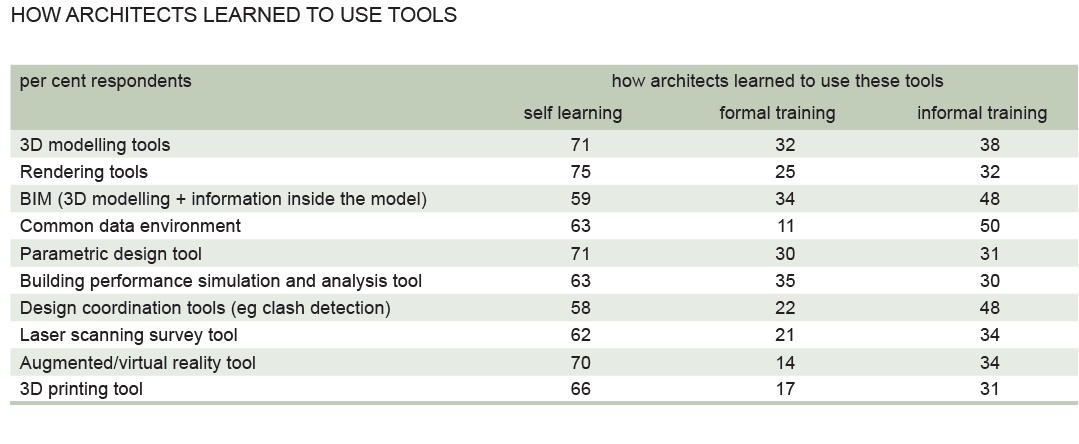
Dr. Veronika Schröpfer, Head of EU Research Projects at the Architects’ Council of Europe
Images and sources of numbers from the ACE Sector Study: https://www.ace-cae.eu/fileadmin/user_upload/2020ACESECTORSTUDY.pdf
The benefits of a digitally informed and empowered workforce article
ARISE Programme Manager Paul Mc Cormack has had his 5th article published in a series of 6 for the Dublin magazine, Building Services Engineering. The article by Paul titled, 'The benefits of a digitally informed and empowered workforce' is on pages 10 and 11 of the January 2022 issue. You can read it here : https://issuu.com/patlehane/docs/building_services_engineering_jan_feb_2022_web_fil?fr=sYWRiNjcyNDY0
